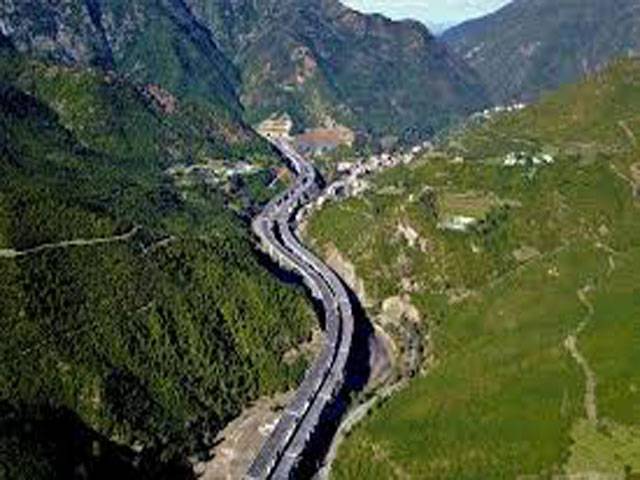BEIJING - The China State Construction Engineering Corp, the largest Chinese builder, has announced completion of an infrastructure project each in Pakistan and Algeria, two economies that are participating in the Belt and Road Initiative.
“This marks the construction giant’s efforts to boost regional cooperation amid the COVID-19 pandemic,” China Daily reported on Friday. According to CSCEC, the Sukkur-Multan Motorway, which is the largest transportation infrastructure project under the China-Pakistan Economic Corridor, was officially handed over to the Pakistani side last week. The 392-kilometer-long motorway, also known as the M5 motorway in Pakistan, is part of the country’s Peshawar-Karachi Motorway and was designed for speeds of up to 120 km/hour with a total investment of about $2.89 billion.
“The motorway opened to traffic in November last year and has greatly improved traffic conditions and helped drive economic development in central Pakistan,” said Xiao Hua, general manager of the PKM project.
“More than 29,000 jobs were created for the locals in the peak time of construction and the operation of the motorway will be all done by the Pakistani side (from now on),” Xiao said. Apart from the main body of the project, the Chinese constructor also built schools, roads, bridges, wells and water channels for the locals to make their lives more convenient, he said.
The China-Pakistan Economic Corridor projects have achieved major progress despite grave economic and health challenges posed by the COVID-19 pandemic, the daily quoted Asim Saleem Bajwa, chairman of the CPEC Authority, as saying.
“After successful completion of the first phase, the CPEC is expanding into its second phase as per schedule despite a very serious setback of COVID-19 around the world, ensuring economic stability and well-being of the people of Pakistan,” Bajwa said while addressing an awarding ceremony for outstanding Pakistani staff of CPEC projects.
In Algeria in northern Africa, CSCEC has helped build an expressway linking Chiffa and Berrouaghia. It is part of the Algeria South-North Expressway project undertaken by CSCEC. The expressway opened to traffic last weekend, passing across the Atlas Mountains and through the Sahara Desert.
With a total length of 53 kilometers, the expressway goes through the Atlas Mountains, which was the “bottleneck” part of the Algeria South-North Expressway, for its extremely high construction difficulties.
In the future, the expressway will also extend further southward to connect Mali, Niger and other countries in Sahil Area.
Proposed in 2013, the BRI comprises the Silk Road Economic Belt and the 21st century Maritime Silk Road, which aim at building trade and infrastructure networks connecting Asia with Europe and Africa along the ancient trade routes of the Silk Road.
The government would continue to encourage SOEs (state-owned enterprises) to build more key infrastructure and manufacturing projects in the country and BRI partner economies over the next five years, said Peng Huagang, secretary-general of the State-owned Assets Supervision and Administration Commission of the State Council.
Tuesday, November 26, 2024
China’s largest builder showcases BRI benefits with highways in Pakistan, Algeria

Over 20,000 applications received for Government Hajj Scheme 2024
12:02 PM | November 26, 2024
Trump vows tariffs on China, Canada and Mexico over fentanyl, immigration
11:52 AM | November 26, 2024
US urges peaceful protests, respect for human rights in Pakistan
11:41 AM | November 26, 2024
Unemployed husband kills wife over her success
November 26, 2024
Ombudsperson stresses need to tackle harassment cases
November 26, 2024
-
Gallup survey: 47pc of Pakistanis never used trains
-
Gallup survey: 47pc of Pakistanis never used trains
-
Digital nomadism redefines work and travel across the globe
-
Lahore tops global pollution rankings as smog worsens, AQI reaches hazardous levels
-
Hunger crisis to increase in South Sudan, warns UN
-
Pakistan’s judiciary champions climate justice at COP29 in Baku
Fixing PSDP
November 26, 2024
KP’s Failure
November 26, 2024
Invading Islamabad
November 26, 2024
Economic Imperative
November 25, 2024
Systematic Change
November 25, 2024
Smog War Between India and Pakistan
November 26, 2024
The Exodus of Talent
November 26, 2024
Exotic Food
November 25, 2024
Karachi Language Barrier
November 25, 2024
APSUS Report and Economic Challenges
November 25, 2024
ePaper - Nawaiwaqt
Nawaiwaqt Group | Copyright © 2024





